March 18, 2000
1.Taiwan experiences its first transition of power
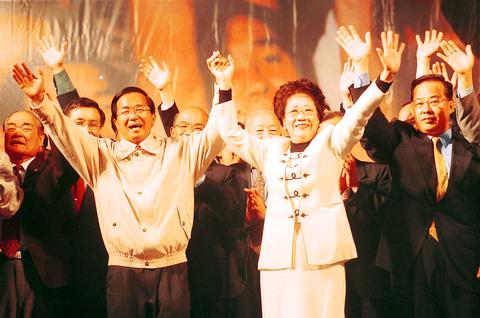
PHOTO: TAIPEI TIMES
This year, Taiwan experienced its first change of power from the KMT to the DPP; the latter led by the party's homegrown political star Chen Shui-bian (陳水扁).
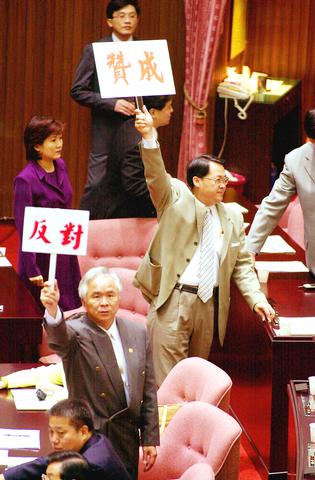
PHOTO: TAIPEI TIMES
Chen, ably assisted by running mate Annette Lu (
The Chen-Lu ticket received only 39.3 percent of the vote (4.9 million votes) but it was enough to beat the Soong on 37 percent (4.6 million votes) and the KMT's Lien, who received around 2.3 million votes.
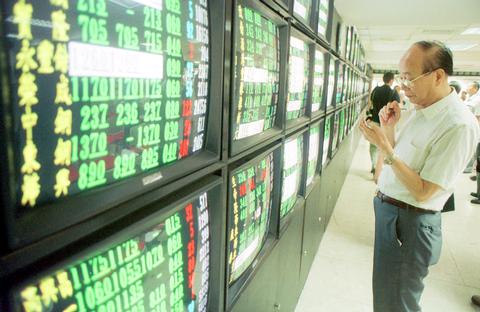
PHOTO: TAIPEI TIMES
Chen's rise to President took many by surprise. After narrowly losing his re-election bid for Taipei mayor in December 1998, Chen picked himself up, dusted himself off, and set his eyes on the grand prize. It wasn't an easy road to follow.
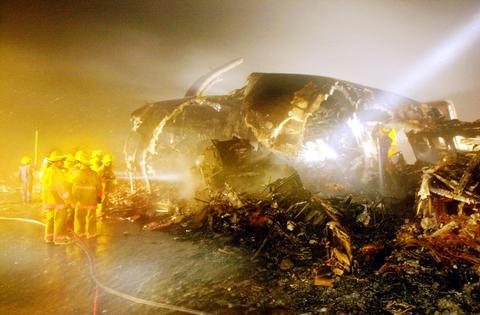
PHOTO: TAIPEI TIMES
At the beginning of the presidential campaign, Chen trailed in all opinion polls. His saviour proved to be his most dangerous opponent: James Soong. Angry at being passed over as the KMT's candidate, Soong split from the party in July and struck out on his own. With the KMT vote now split in two, Chen began to rise in the polls. Things only got better for Chen when Soong was dragged into a corruption scandal that almost ended his campaign.
Chen used the opportunity to raise the issue of eliminating "black gold politics."
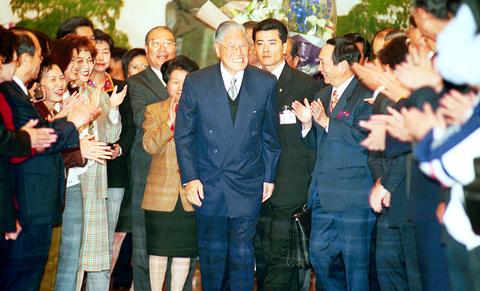
PHOTO: TAIPEI TIMES
"I can't image why the KMT and Soong made so many mistakes during the campaign," mused Chen's campaign executive manager, DPP secretary-general Chiou I-jen (
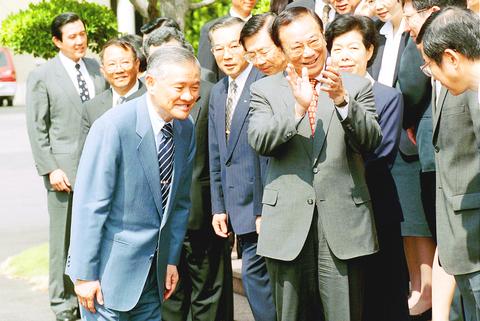
PHOTO: TAIPEI TIMES
Whatever the reason -- and we may never know -- Chen rode the momentum home in a stunning victory on March 18; a victory that made headlines around the world, and caused jaws to drop in the dusty corridors in Beijing.
October 27, 2000
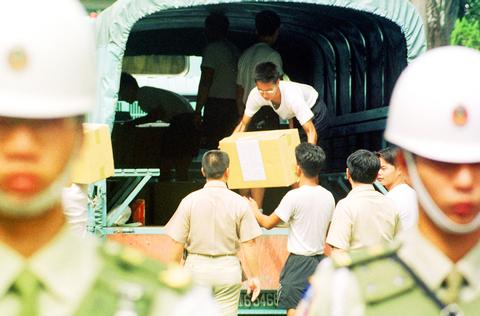
PHOTO: TAIPEI TIMES
2.Fourth Nuclear Power Plant scrapped
The Chen administration's decision to cancel the Fourth Nuclear Power Plant (
Announced on Oct. 27, the Executive Yuan killed the budget for the power plant -- long a point of contention between the DPP and KMT -- shortly after a televised visit between President Chen and KMT Chairman Lien Chan, the first since Chen took office.
As the president's approval rating sunk below 40 percent, opposition lawmakers, led by the KMT, began rallying support to recall the president. Last week, opposition lawmakers said they had the support of the 147 legislators they needed to pass a recall motion.
Aside from seeking political revenge, opposition lawmakers questioned the constitutionality of the decision made by the Executive Yuan to kill the budget for the plant.
Opponents to the move claim a budget has the status of a law and cannot be amended or revoked without Legislative Yuan approval.
The Council of Grand Justices is currently reviewing the decision made by the Cabinet and a ruling is expected some time before Chinese New Year.
Commercial losses from cancelation of the Fourth Nuclear Power Plant have been estimated to be between NT$70 billion and NT$90 billion, but Ministry of Economic Affairs officials have said that the number could be lowered to NT$30 billion if the two 1,350 megawatt boiling water reactors on order from the US-based General Electric Co are sold off. Consumers may be asked to pick up the rest of the tab.
December 22, 2000
3.TAIEX hits a five-year low
While the nation ushered in 2000 with a robust stock market, several months into the new administration the investment landscape changed dramatically.
Scared off by the government's haphazard economic policy-making and its inability to find common ground with the majority opposition, stock investors bolted from the trading floors early on in the new administration of President Chen.
With each successive economic blunder made by the inexperienced Chen team, investors strayed further from the market, leaving listed firms lacking crucial capital to expand further.
The transfer of power was not the only factor influencing the bourse.
Taiwan's weighted index -- which regularly mirrors the movements of the US' high-tech market, the NASDAQ -- suffered heavily as the US economy moved into unchartered waters.
The turbulance forced the NASDAQ into a reality check of its own.
Over the last few months, sales of electronic goods and PC demand have tapered off in the US, bringing the technology-dominated index down 53.8 percent from its 5048 high in March to just 2,320 points over the past few days. Following suit, the TAIEX -- which opened its first trading day of 2000 at 8,448.84 points -- lost over 40 percent of its value to hit a five-year low recently of nearly 4,800 points.
The NT dollar was also not spared by the economic waves of change.
While the nation's monetary unit opened the year at NT$31.38, recent weakening of the currency against the US dollar has taken it down to near NT$33.18 as the year nears its close.
December 13, 2000
4.Small three links gets go-ahead
In accordance with the Offshore Islands Development Bill (
and China, a policy known as the "small three links."
The Executive Yuan announced on Dec. 13 that it would put the policy into action in January. According to the regulations announced by the Cabinet, Kinmen and Matsu residents are now allowed to visit China while Chinese may also visit Kinmen and Matsu upon application.
Meanwhile, direct shipping from Kinmen's Liaolo port (
Premier Chang Chun-hsiung (
A few trial runs for direct cross-strait transportation have been attempted recently by legislators to test the policy's feasibility.
All these trial runs failed, however, as no negotiation with China has been conducted about opening its ports to Taiwan shipping had been conducted beforehand.
Nonetheless, the Cabinet will initiate the operation as scheduled. Chinese authorities have, so far, been cool in their response to the policy even though Mainland Affairs Council chairwoman Tsai Ing-wen (
October 31, 2000
5.Singapore Airlines Flight SQ006 crashes
As Taiwan was being lashed by one of the worst typhoons of the year, Singapore Airlines Flight SQ006 was taxiing down a windy and wet runway at CKS airport, bound for Los Angeles. The pilot of the plane mistakenly turned down the wrong runway, which was under construction.
As the Boeing 747-400 jumbo began rolling down the runway and gaining speed for take-off, it rammed through a cement barricade and into two backhoes. The jet burst into flames and broke apart.
Eighty-three of the 179 passengers on board died in the crash. Some of those trapped inside the main fuselage burned to death while others died later in hospital.
Data from the cockpit voice recorder and the flight data recorder showed that ground conditions at the airport may have contributed to the tragedy.
Efforts by Taiwan's prosecutors to hold the three Singapore Airlines pilots in Taiwan and possibly prosecute them for the accident triggered a strong backlash from airlines and pilots around the world. The International Federation of Pilots said they would boycott flights to Taiwan if the prosecutors did not release the three before Christmas. The pilots headed home last week.
Authorities are still conducting tests to find out whether or not a light on the runway, which should not have been on, was lit at the time the plane had taken off.
The crash was the second tragedy Taiwan's CKS International Airport has seen in the past decade. In 1998, a China Airlines flight from Bali crashed into a residential area near the airport killing all 196 on board and six individuals on the ground. The crash prompted the formation of Taiwan's Aviation Safety Council.
October 4, 2000
6.Tang Fei quits as premier
In a stunning turnaround in late March, the KMT's Minister of National Defense Tang Fei (
Before taking office in May 20, Tang had undergone chest tumor surgery and was suffering from its complications and he therefore offered to resign from the post several times.
But Chen insisted that Tang stay on as premier since Tang represented a symbolic alleviation to a possible political standoff, domestic military coup and rising cross-strait tensions in light of the first-ever transfer of power in Taiwan.
Tang, a military stalwart for more than 40 years, ran the Cabinet with a liberal mind, democratic practices and reformist progress instead of the iron hand of a military strongman.
However, the so-called Chen-Tang administration came to an end in early October, after four months, with Tang citing his poor health.
Most political analysts, however, argued that Tang stepped down due to his disagreement with Chen over the construction of the Fourth Nuclear Power Plant.
Tang himself also admitted later that idealistic differences had made it difficult for him to continue his premiership.
Having lacked a financial and economic background, Tang also came under pressure when the domestic economy started its downturn and the stock market began declining.
On Oct. 4, Tang bowed out with Chen's blessing and then-vice premier Chang Chun-hsiung (張俊雄) -- a DPP member -- succeeded as the new premier, putting the DPP's minority government on the center stage.
March 24, 2000
7.Lee Teng-hui forced to step down as KMT chairman
After 55 years of rule in Taiwan since their retreat from the Chinese mainland in 1946, the KMT lost power for the first time during the 2000 presidential election and the defeat also ended former president Lee Teng-hui's leadership of both the party and the state.
"It is a galling shame and humiliation (奇恥大辱) for the 100-year-old KMT," said KMT presidential candidate Lien Chan (連戰) after losing the election on March 18.
During the night of March 18, thousands of people, including supporters of the independent presidential candidate James Soong (宋楚瑜) and KMT members, besieged the KMT's central headquarters to request the resignation of KMT Chairman Lee.
The demonstrations continued for over 10 days and even attacked police, passersby, and KMT officials -- anyone who wanted to enter or leave the headquarters for meeting.
Lee announced his resignation in a statement at the party's Central Standing Committee meeting on March 24, saying he should take responsibility for the election failure and "express concerns about the party's future." "We must plant ourselves firmly in the land and cultivate our grassroots so that we can accumulate energy for development, broaden our base of public approval and win the trust and support of the people, in order to ... regain power in the future," Lee was quoted as saying during the meeting by KMT spokesman Huang Hwei-chen (
Lien immediately became the acting party chairman, pledging to lead the KMT's reform to win back power in next presidential election in 2004. Lien was elected chairman at the party's National Congress meeting in June.
Lee had succeeded the presidency from Chiang Chin-kuo (
July 31, 2000
8.Task force set up to probe Yin Ching-feng murder
At a presidential press conference on July 31, President Chen Shui-bian (
Whether or not Yin's murder can be solved has widely been regarded by the public as an important indicator of the Chen administration's determination and capability to rid the nation of "black gold," or corruption.
Captain Yin's body was found floating off Taiwan's northeast coast on Dec. 10, 1993. A few days later, the biggest ever arms deal scandal in Taiwan's military history became public.
It is believed Yin, then chief executive of the Navy General Headquarters' weapons procurement office, was killed because he was to reveal corruption in certain arms deals. The investigation of his death, from the beginning, faced suspicious resistance from within the navy.
Years on, some mid-ranking naval officials and arms dealers have been convicted of betraying secret information and bribery. But the details surrounding the incident, for the most part, have remained mysterious.
During his term as legislator and the convener of the legislature's National Defense Committee, Chen had been devoted to pursuing the truth behind the Yin case.
With Chen's election in March and the public's high expectations that he would break the chains of KMT corruption and eradicate "black gold," the investigation into Yin's case and related arms purchase scandals was restarted.
The special task force was set up the day following Chen's announcement.
March 2000
9.People First Party formed
After his presidential election defeat, independent candidate James Soong (宋楚瑜) was encouraged to form a new political party. In late March, the People First Party (PFP) was founded, and Soong along with his running mate Chang Chao-hsiung (張昭雄) were elected party chairman and vice chairman at the Taipei Grand Hotel. Soong, defeated by the DPP's Chen Shui-bian (陳水扁) by a margin of only three percentage points for the presidency, immediately attracted many former KMT and New Party members to his party.
Within nine months, membership of the PFP has grown to a rate of ten thousand new members per month including 19 incumbent legislators who are regarded as clean politicians with good reputations.
These 19 PFP legislators also outshine legislators from other parties in the legislature in terms of political performance and interpellation tactics, according to an evaluation report by the Taipei Society (澄社) in mid-September.
The PFP, therefore, has become a leading political force in the legislature despite holding a minority of legislative seats.
The party's public support has also risen to almost match that of the ruling DPP, posing a great threat to both the DPP and the KMT in next year's legislative election.
Party Chairman Soong recently reached out to recruit DPP members, including former DPP chairmen Shih Ming-teh (施明德) and Hsu Hsin-liang (許信良), as well as Sisy Chen (陳文茜), vowing to push forward a reorganization among political parties. Soong said he would welcome the participation of these three in the party. Others commented that Soong's move to include them helped localize the party.
May 19, 2000
10.KMT and DPP amend Constitution
The curtain was drawn on the National Assembly after the term of the third assembly of deputies expired on May 19, 2000.
From that day, the National Assembly has taken on its new status as a non-standing body that only convenes for specific purposes, with its deputies appointed based on specific missions. Above all, it has ceased to be a body with the proactive power to launch constitutional reforms -- a function that had earned the body the unfortunate name of "constitutional monster."
The Assembly has launched a total of six constitutional reforms over the past decade, and a major factor blamed for the high frequency of reforms was a 1992 amendment that changed the interval between sessions from every six years to once a year.
Among the reforms, many were related to the adjustment of the governmental structures. These included introducing direct elections for legislators, National Assembly deputies, president and local government chiefs; streamlining the hierarchy of the government; changing the governmental system to become one similar to a "semi-presidency"; and marginalizing the Assembly itself.
Following its marginalization, the remaining functions of the Assembly are to vote on constitutional amendments and national boundary changes proposed and passed by the Legislative Yuan by a three-quarters majority.
The proposals again require a three-quarters majority to obtain the Assembly's ratification before the changes are written into the Constitution.
The Assembly's other function will be to vote on any motion to impeach the president or vice president, which must be initiated and passed by the legislature by a two-thirds majority. It must win another two-thirds majority of support in the Assembly to succeed.

WAITING GAME: The US has so far only offered a ‘best rate tariff,’ which officials assume is about 15 percent, the same as Japan, a person familiar with the matter said Taiwan and the US have completed “technical consultations” regarding tariffs and a finalized rate is expected to be released soon, Executive Yuan spokeswoman Michelle Lee (李慧芝) told a news conference yesterday, as a 90-day pause on US President Donald Trump’s “reciprocal” tariffs is set to expire today. The two countries have reached a “certain degree of consensus” on issues such as tariffs, nontariff trade barriers, trade facilitation, supply chain resilience and economic security, Lee said. They also discussed opportunities for cooperation, investment and procurement, she said. A joint statement is still being negotiated and would be released once the US government has made

NEW GEAR: On top of the new Tien Kung IV air defense missiles, the military is expected to place orders for a new combat vehicle next year for delivery in 2028 Mass production of Tien Kung IV (Sky Bow IV) missiles is expected to start next year, with plans to order 122 pods, the Ministry of National Defense’s (MND) latest list of regulated military material showed. The document said that the armed forces would obtain 46 pods of the air defense missiles next year and 76 pods the year after that. The Tien Kung IV is designed to intercept cruise missiles and ballistic missiles to an altitude of 70km, compared with the 60km maximum altitude achieved by the Missile Segment Enhancement variant of PAC-3 systems. A defense source said yesterday that the number of

‘CRUDE’: The potential countermeasure is in response to South Africa renaming Taiwan’s representative offices and the insistence that it move out of Pretoria Taiwan is considering banning exports of semiconductors to South Africa after the latter unilaterally downgraded and changed the names of Taiwan’s two representative offices, the Ministry of Foreign Affairs (MOFA) said yesterday. On Monday last week, the South African Department of International Relations and Cooperation unilaterally released a statement saying that, as of April 1, the Taipei Liaison Offices in Pretoria and Cape Town had been renamed the “Taipei Commercial Office in Johannesburg” and the “Taipei Commercial Office in Cape Town.” Citing UN General Assembly Resolution 2758, it said that South Africa “recognizes the People’s Republic of China (PRC) as the sole

Taiwanese exports to the US are to be subject to a 20 percent tariff starting on Thursday next week, according to an executive order signed by US President Donald Trump yesterday. The 20 percent levy was the same as the tariffs imposed on Vietnam, Sri Lanka and Bangladesh by Trump. It was higher than the tariffs imposed on Japan, South Korea and the EU (15 percent), as well as those on the Philippines (19 percent). A Taiwan official with knowledge of the matter said it is a "phased" tariff rate, and negotiations would continue. "Once negotiations conclude, Taiwan will obtain a better